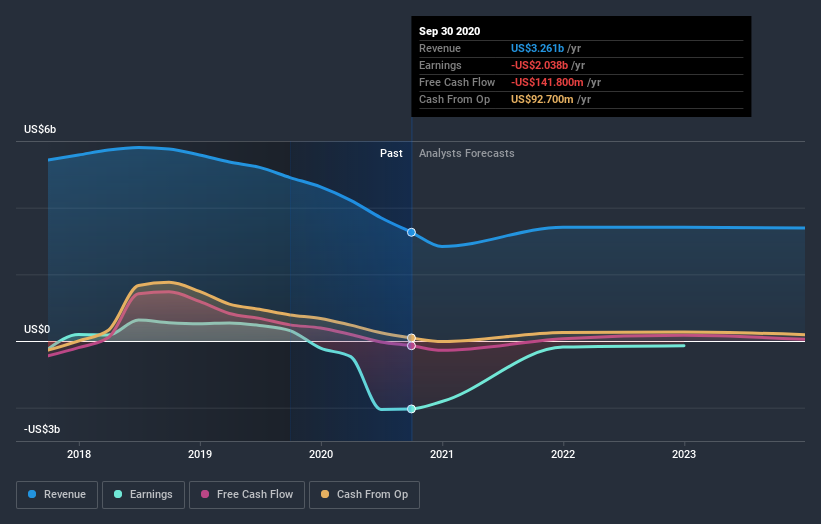Peabody Energy Corporation (NYSE:BTU) Just Reported Earnings, And Analysts Cut Their Target Price

Shareholders in Peabody Energy Corporation (NYSE:BTU) had a terrible week, as shares crashed 27% to US$0.90 in the week since its latest quarterly results. Revenues of US$671m fell short of estimates by 13%, but statutory losses were tightly controlled, with the per-share loss of US$0.69 being 11% smaller than consensus predictions. Earnings are an important time for investors, as they can track a company's performance, look at what the analysts are forecasting for next year, and see if there's been a change in sentiment towards the company. We thought readers would find it interesting to see the analysts latest (statutory) post-earnings forecasts for next year.
See our latest analysis for Peabody Energy
Following the latest results, Peabody Energy's five analysts are now forecasting revenues of US$3.41b in 2021. This would be a credible 4.7% improvement in sales compared to the last 12 months. Losses are predicted to fall substantially, shrinking 91% to US$1.90. Before this earnings announcement, the analysts had been modelling revenues of US$3.58b and losses of US$2.26 per share in 2021. Although the revenue estimates have fallen somewhat, Peabody Energy'sfuture looks a little different to the past, with a the loss per share forecasts in particular.
The analysts have cut their price target 28% to US$2.10per share, suggesting that the declining revenue was a more crucial indicator than the forecast reduction in losses. That's not the only conclusion we can draw from this data however, as some investors also like to consider the spread in estimates when evaluating analyst price targets. There are some variant perceptions on Peabody Energy, with the most bullish analyst valuing it at US$3.00 and the most bearish at US$0.90 per share. This is a fairly broad spread of estimates, suggesting that analysts are forecasting a wide range of possible outcomes for the business.
Looking at the bigger picture now, one of the ways we can make sense of these forecasts is to see how they measure up against both past performance and industry growth estimates. For example, we noticed that Peabody Energy's rate of growth is expected to accelerate meaningfully, with revenues forecast to grow 4.7%, well above its historical decline of 4.4% a year over the past five years. By contrast, our data suggests that other companies (with analyst coverage) in a similar industry are forecast to see their revenue grow 9.1% per year. So although Peabody Energy's revenue growth is expected to improve, it is still expected to grow slower than the industry.
The Bottom Line
The most obvious conclusion is that the analysts made no changes to their forecasts for a loss next year. Unfortunately, they also downgraded their revenue estimates, and our data indicates revenues are expected to perform worse than the wider industry. Even so, earnings per share are more important to the intrinsic value of the business. Still, earnings per share are more important to value creation for shareholders. The consensus price target fell measurably, with the analysts seemingly not reassured by the latest results, leading to a lower estimate of Peabody Energy's future valuation.
Following on from that line of thought, we think that the long-term prospects of the business are much more relevant than next year's earnings. We have forecasts for Peabody Energy going out to 2023, and you can see them free on our platform here.
However, before you get too enthused, we've discovered 3 warning signs for Peabody Energy that you should be aware of.
This article by Simply Wall St is general in nature. It does not constitute a recommendation to buy or sell any stock, and does not take account of your objectives, or your financial situation. We aim to bring you long-term focused analysis driven by fundamental data. Note that our analysis may not factor in the latest price-sensitive company announcements or qualitative material. Simply Wall St has no position in any stocks mentioned.
Have feedback on this article? Concerned about the content? Get in touch with us directly. Alternatively, email editorial-team@simplywallst.com.

